Related Research Articles
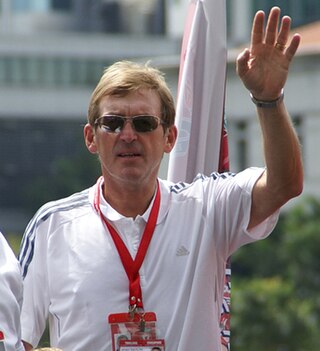
Sir Kenneth Mathieson Dalglish is a Scottish former football player and manager. During his career, he made 338 appearances for Celtic and 515 for Liverpool, playing as a forward, and earned a record 102 caps for the Scotland national team, scoring 30 goals, also a joint record. Dalglish won the Ballon d'Or Silver Award in 1983, the PFA Players' Player of the Year in 1983, and the FWA Footballer of the Year in 1979 and 1983. In 2009, FourFourTwo magazine named Dalglish the greatest striker in post-war British football, and he has been inducted into both the Scottish and English Football Halls of Fame. He is very highly regarded by Liverpool fans, who still affectionately refer to him as King Kenny, and in 2006 voted him top of the fans' poll "100 Players Who Shook the Kop".

Motherwell Football Club is a Scottish professional football club based in Motherwell, North Lanarkshire, which plays in the Scottish Premiership. Motherwell have not dropped out of the top-flight of Scottish football since 1985, and have lifted one trophy in that time – the Scottish Cup in 1991.
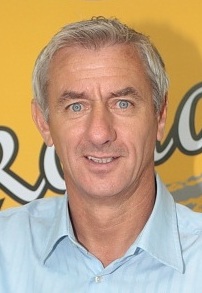
Ian James Rush is a Welsh former professional footballer who played as a forward. At club level Rush played for Liverpool from 1980–1987 and 1988–1996. He is the club's all-time leading goalscorer, having scored a total of 346 goals in all competitions at the club. At international level, Rush made 73 appearances for the Wales national football team and remained the record goalscorer with 28 goals between 1980 and 1996, until the record was broken by Gareth Bale in 2018.

Emlyn Walter Hughes was an English footballer. He started his career at Blackpool in 1964 before moving to Liverpool in 1967. He made 665 appearances for Liverpool and captained the side to three league titles and an FA Cup victory in the 1970s. Added to these domestic honours were two European Cups, including Liverpool's first in 1977; and two UEFA Cup titles. Hughes won the Football Writers' Player of the Year in 1977. Hughes completed a full set of English football domestic honours by winning the League Cup with Wolverhampton Wanderers in 1980. In addition to Wolves, he later played for Rotherham United, Hull City, Mansfield Town and Swansea City. Hughes earned 62 caps for the England national team, which he also captained.

John "Ian" St John was a Scottish professional football player, coach and broadcaster. St John played as a forward for Liverpool throughout most of the 1960s. Signed by Bill Shankly in 1961, St John was a key member of the Liverpool team that emerged from the second tier of English football to win two league titles and one FA Cup—in which he scored the winner in the 1965 final—to cement a position as one of the country's top sides. He played for Scotland 21 times, scoring nine goals.

David Fairclough is an English retired footballer, most famous for playing for Liverpool as a striker during the 1970s and 1980s.
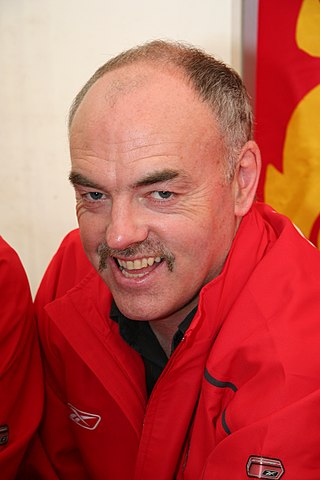
John Wark is a Scottish former footballer who spent most of his playing time with Ipswich Town. He won a record four Player of the Year awards before becoming one of the four inaugural members of the club's Hall of Fame. Wark had long spells at the club, which bookended his career, and a third, brief interlude dividing his briefer periods at Liverpool and Middlesbrough. A versatile player, Wark played most of his professional games as a midfielder, although he sometimes played as a central defender and on occasion as a striker.

Gary McAllister MBE is a Scottish professional football coach and former player.

David Cooper was a Scottish professional football player who played as a winger.
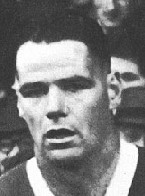
William Beveridge Liddell was a Scottish footballer, who played his entire professional career with Liverpool. He signed with the club as a teenager in 1938 and retired in 1961, having scored 228 goals in 534 appearances. He was Liverpool's leading goalscorer in the league in eight out of nine seasons from 1949–50 to 1957–58, and surpassed Elisha Scott's club record for most league appearances in 1957.
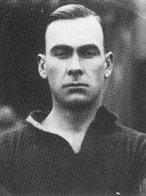
Gordon Hodgson was a professional sportsman, born in Transvaal Colony, who is best known as a striker for Liverpool and as a fast bowler for Lancashire. He won two international caps for South Africa and three for England.

William Stevenson is a Scottish former professional football player and manager. He played for Rangers, Liverpool, Stoke City, Tranmere Rovers and the Vancouver Whitecaps.
Adolph Jonathan "Alf" Hanson was a football player for Liverpool, Chelsea, South Liverpool, Shelbourne, Ellesmere Port Town and Tranmere Rovers.
Thomas Robertson was a Scottish footballer who played as an outside left. He was part of the Heart of Midlothian team that won the Scottish league title in 1897. He also played for Liverpool between 1898 and 1902, helping them to the Football League title in 1901.
Robert Crawford was a footballer who played for Liverpool during the early part of the 20th century.
Thomas Miller was a Scottish footballer who played for Liverpool and the Scotland national team during the early part of the 20th century.
David Wright was a Scottish footballer who played for Liverpool.

Thomas Smith was an English footballer, who played as a defender at Liverpool for 16 years from 1962 to 1978. Known for his uncompromising defensive style, manager Bill Shankly once said of him: "Tommy Smith wasn't born, he was quarried". A central defender for most of his career, Smith's most memorable moment for the club probably came when he scored Liverpool's second goal in the 1977 European Cup Final against Borussia Mönchengladbach. Smith played once for England in 1971, and also played at club level for Tampa Bay Rowdies, Los Angeles Aztecs and Swansea City.

Fred Geary was an English professional footballer who played at centre forward for Everton in the 1890s, and made two appearances for England, scoring a hat-trick on his debut.

James Forrest is a Scottish professional footballer who plays as a right winger for Scottish Premiership club Celtic and the Scotland national team.
References
- ↑ "Bobby Graham". Barry Hugman's Footballers. Retrieved 17 April 2017.
- ↑ Crawford Boyd interview and profile www.qosfc.com